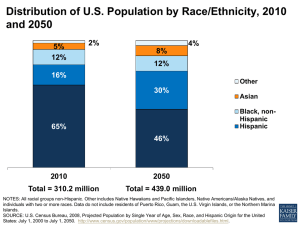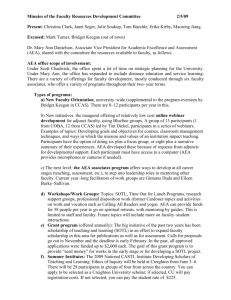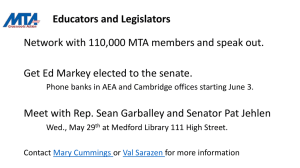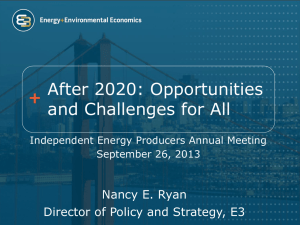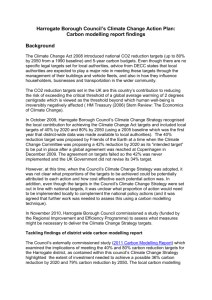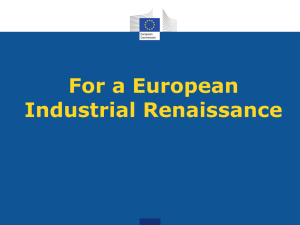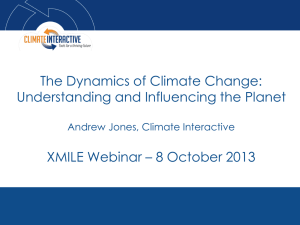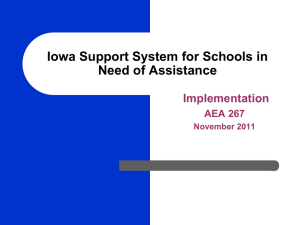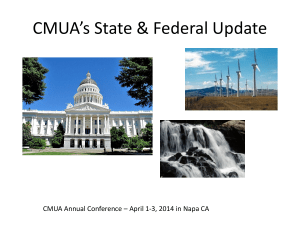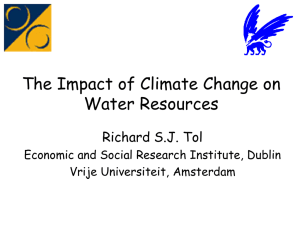Chris Dodwell presentation
advertisement
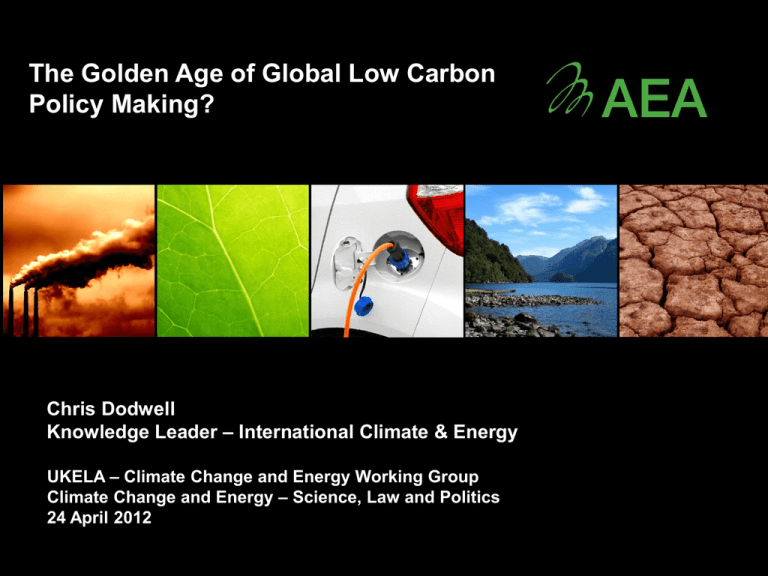
The Golden Age of Global Low Carbon Policy Making? Chris Dodwell Knowledge Leader – International Climate & Energy UKELA – Climate Change and Energy Working Group Climate Change and Energy – Science, Law and Politics 24 April 2012 Leading Global Environmental Consultancy AEA delivers over $120 million annually of energy, environmental, transportation, and climate policy support and program implementation services to: UK Government US Government European Commission International Institutions …. energy efficiency, clean energy, transport, GHG inventories, air quality, carbon management, climate change strategies, adaptation, resource management …. OUTLINE • Global challenges: climate, energy, investment • Policy responses: economic signals & risk reduction mechanisms • Role of international climate regime • UK policy response • Application of lessons learned Inaction is not an option 2020 action: significant but not enough 1. Implementing 2020 pledges is vital 2. Action before 2020 must be strengthened 3. Policy and investment groundwork for post-2020 reductions must be laid UNEP Bridging the Gap 2011 IEA World Energy Outlook 2011 Investment challenge: redirecting “investment as usual” • IEA ETP Baseline scenario requires investment between 2010 and 2050 of US$270 trillion •Total investment requirements under ambitious scenario increase by 17% to US$317 trillion • IEA: Annual investment in low carbon $750b by 2030, to £1.6t by 2050 • Bloomberg NEF: clean energy investment $263b in 2010 ($52b in 2004) but Q1 2012 lowest since 2009 Policies for supporting low carbon technologies Combining policy and financial instruments effectively Economic signals – (a lot of) work in progress Reducing risks – international perspective Country risk Make country risk guarantees more explicit to institutional investors Low carbon policy risk Offer low carbon risk cover Currency risk Establish currency funds offering foreign exchange hedging products Deal flow problems Create low carbon project development companies Difficulty evaluating multiple, overlapping risks Public sector takes “first loss equity position in funds Adapted from UNEP & partners/Vivid Economics 2009 Reducing risks - blooming of many flowers Measure o What contributions should be counted as “climate finance”? o How to tackle private sector flows? Report o Distribution: where is climate finance going? o What forms of finance, data, format, methodologies, etc ? Verify Tracking climate finance & learning lessons o Scale of support o Effectiveness of support o Cost-benefits of activities or wider benefits of investments International negotiations: not all or nothing The Durban endgame: “the huddle to save the world” “a protocol, another legal instrument or an agreed outcome with legal force” Lessons learned: UK policy response Economic signals Reducing investment risk Long term perspective - both policy and investment Lessons learned: DECC 2050 Calculator – balancing energy and climate goals Lessons learned: UK Low Carbon Institutions • Climate Change Programme 2001 to deliver voluntary target 20% CO2 reductions by 2010 (tougher than UK’s Kyoto target) • Climate Change Program Review (CCPR) initiated in 2004 to put UK back on track but failed to achieve objectives • Political opportunity to strengthen low carbon institutions • NGO campaign + business community traction on climate change • Political competition – parties taking a strong stance on climate change • Reframing of climate change as an economic issue - Stern’s review for HMT of the Economics of Climate Change • Engaged political owner within government • Outcome: Office of Climate Change (2006) →Committee on Climate Change (2008) →formation of DECC (2008) Why a golden age for policy makers? 1. Countries across the world now facing up to the challenge of implementing their Copenhagen pledges 2. Loud, long, legal economic signals needed ... alongside new ways to crowd in private finance 3. Tailored to national circumstances ... supported by international sources 4. No need to wait for a global agreement – international action is already under way 5. Real potential to build effective policies using lessons learned from successes and failures to date AEA Chris Dodwell Knowledge Leader – International Climate Change & Energy AEA 6 New Street Square London EC4A 3BF United Kingdom E: chris.dodwell@aeat.co.uk W: www.aeat.com

